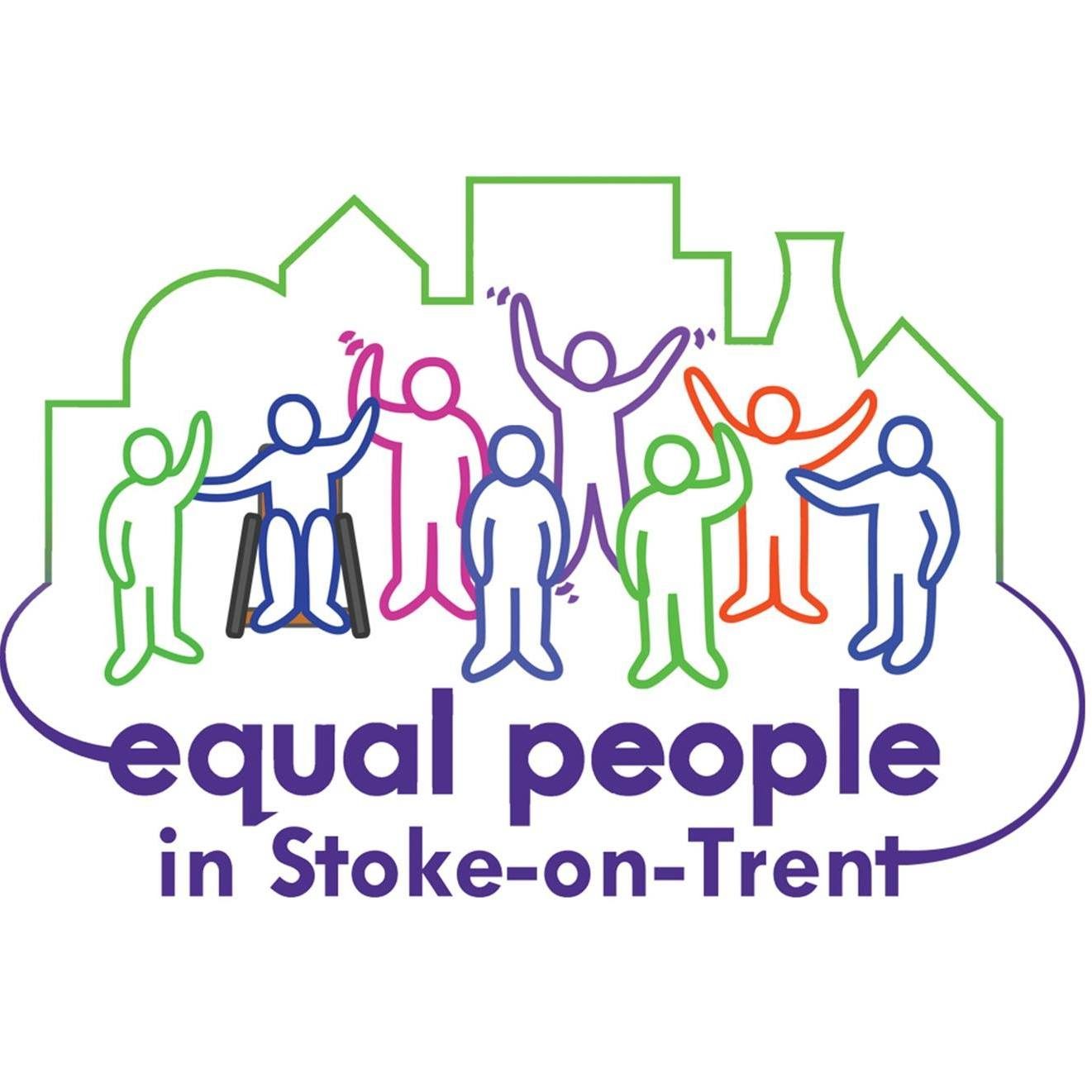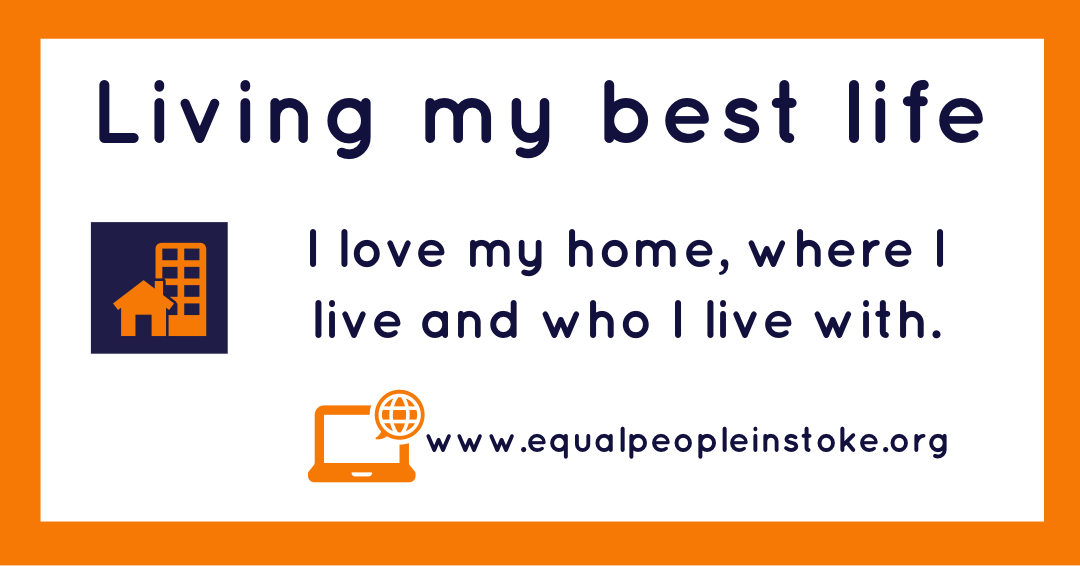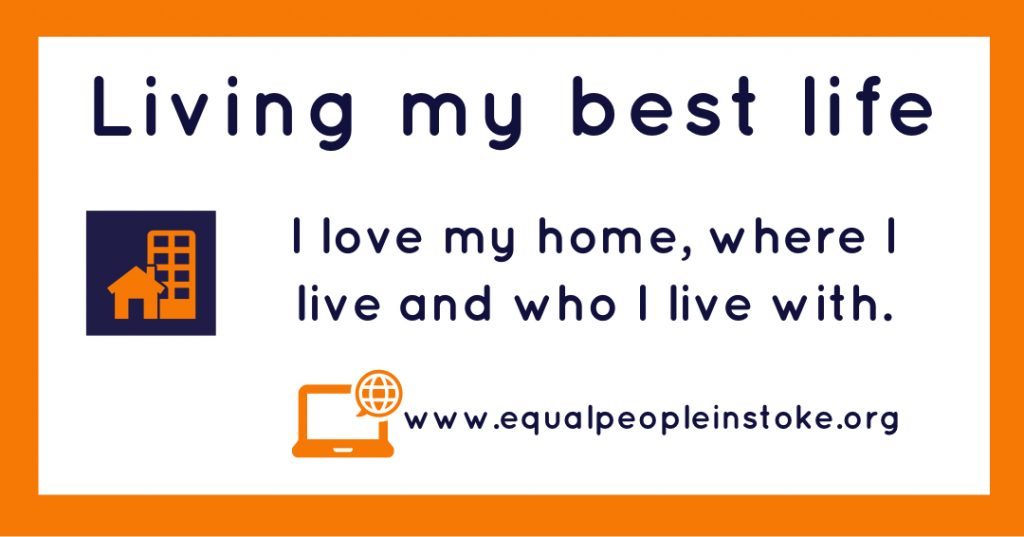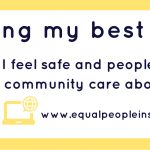Our fourth blog for Learning Disability Week looks at the ‘I Love Where I Live’ outcome in the new Learning Disability Strategy for Stoke-on-Trent, – Living My Best Life.
We can all agree that loving where we live is a really important part of our lives, but what if you were told where you had to live, how you live and who you live with? We take choice for granted when it comes to decisions like where we want to live, but not everyone gets that option. The new learning disability strategy sets out to change this by ‘working on having more choice in the kind of housing we can offer people.’
People have been speaking up to us about this for many years, they told us “Choosing where you live can be very important, I didn’t choose, my mother chose where we moved to, that could be why we moved a lot, we went where we could.”
The strategy aims to give people far more choice of where they can live, with new ideas and schemes to help people choose the right option for them and to be more independent than ever before, people agree that being independent and having choice is really important.
The strategy notes the work of Shared Lives, a city council-run service that trains and matches carers interested in having an adult with a learning disability live with them, either long-term or for short breaks.
Find out more about Shared Lives here: https://www.stoke.gov.uk/info/20052/adults_with_disabilities/302/care_for_an_adult_with_learning_disabilities_in_your_home/2
One person shared their experience of Shared Lives. “I think they help for support, making sure people are safe and looked after. I like the way they use them for respite, think that works really well. I used Shared Lives for respite once, and I’d do it again if I needed to. It was a while back, when I was having quite a few problems, with my seizures I was having a lot more of them, so I agreed to go and stay in a Shared Lives for respite, to give my mum a break, and to help me feel confident, because of my seizures. It worked really well for me, gave me a bit of freedom as well as helping my mum, and keeping me feeling safe, just in case I had another seizure. They were really nice too. If I ever felt like I needed it again, I’d use it again, if I had problems with my seizures and it was stressing me out.”
An issue people said the strategy need to focus more on was supporting people to stay where they are, adapting their homes and planning for the future. This has always been a difficult area for people to talk about as it often means thinking about a time when loved ones have died, one person told us their experience of this when discussing the strategy. The person in this case study wanted to discuss the issue because they felt it had been a positive experience. Their story is below.
“It’s important to get this planning done, plan for the future, what to do. Once you have got the planning done, sorted out your future it gives you all peace of mind. Yes, it was hard to talk about at first, no one wants to think about something happening to your loved ones, but if you don’t do the planning, you don’t have things in place you might end up having to move from the place you call your home.
We talked about what I wanted, in the future, where I wanted to live, I said I wanted to stay here, with my partner, I like my home, where I live.
My mum and my sister talked about it, they decided that when my mum went into hospital, they would leave us for the week, to see how we coped, how we got on. My sister was there if we needed her, she would help if things got too much, but we were on our own unless we called.
This worked well, we had no problems at all, the week went by very fast. After that week, things changed, I felt much more confident that we would be able to cope, my mum and sister were happy with the way things went too. They felt much more confident that I could do it, that I can cope on my own.
This all made me feel so much more independent, now we are planning for us to stay in the family home if something does happen to mum in the future. I feel better as I know my future is more mapped out and my mum and my sister have more peace of mind as they know what’s happening with me, my future.
We are having some things done now to make sure the house is sorted for me, changes to the bathroom so I can use it in my wheelchair, everything feels much more positive now. I know the area, I have nice neighbours that will help if I need it. I couldn’t be happier, my family couldn’t be happier either – it really is important to talk about these things, plan for the future.”
Finally, people told us loving where you live is important because, “having that choice, choosing where you live, who you live with, is very important, making your own decisions, I love living in Stoke, it’s a special place and the people are really friendly and nice.” The strategy also offers more support for people, families and carers, and as one person told us, “Support is really important, earlier the better. You can’t argue with that can you?”





